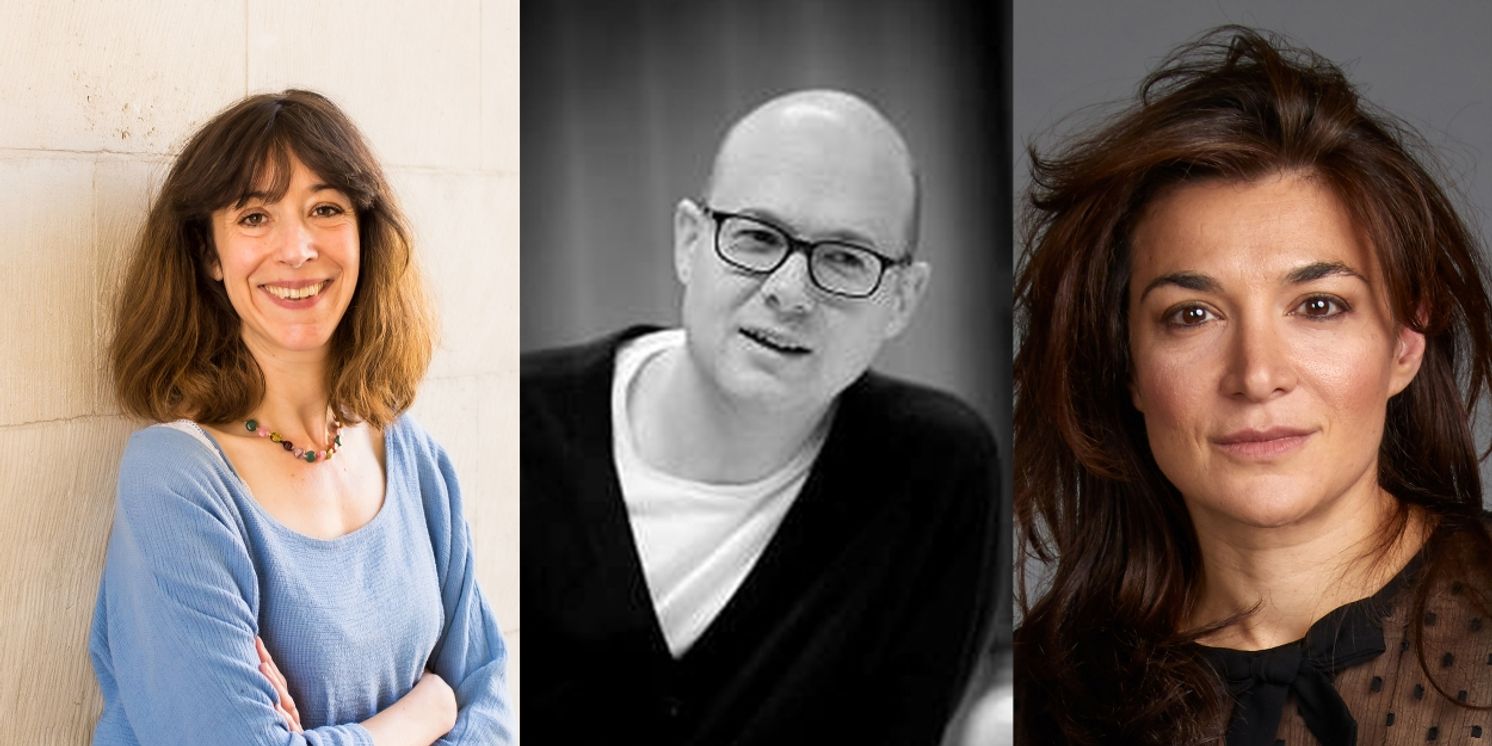Interview: 'It's In Our Bones': Amy Rosenthal, Ryan Craig and Alexis Zegerman on Jewishness, Humanity and Chekhov in THE ARC: A TRILOGY OF NEW JEWISH PLAYS
The writers sit down to discuss what it means to be a Jewish playwright in 2023

Kenneth Tynan wrote that a Jewish playwright is one who "thinks internationally yet feels domestically." He was describing Arnold Wesker, whose Chicken Soup with Barley marked a new chapter for British-Jewish playwriting when it played at the Royal Court in 1958.
It’s easy to see where Tynan is coming from. Set around the familiar domesticity of a kitchen table, Wesker’s play maps post war politics stratified across generations of East End Jews in all its tender warmth, humour, and neuroses. Never before had distinctly modern Jewish themes been brought to the mainstream on a London stage.
Fast forward sixty-five years and Emanate production are bringing The Arc: A Trilogy of New Jewish Plays, three plays by writers Amy Rosenthal, Alexis Zegerman, and Ryan Craig, to Soho Theatre. Following its inaugural production at the Kiln Theatre last year, Emanate have forged a space for Jewish voices to shine a spotlight on and celebrate modern Jewish stories in theatre.
%20Lexi%20Clare.jpg?format=auto&width=1400)
& Abigail Weinstock in rehearsal
Like Wesker’s plays, The Arc’s three plays titled Birth, written by Amy, Marriage, written by Alexis, and Death, written by Ryan, fluctuate between the micro and macro.
“It's the fact that the personal is political, and that you can discuss the big things through a smaller lens, through a domestic lens.” Says Alexis, an idea echoed by Amy:
“For me, the whole part of the joy of the theatre is that you have what you are writing about and what you seem to be writing about. You can write about something light and funny, but actually underneath is the bigger thing, the wider politics.”
Identity politics has brought challenging conversations to the forefront in theatre and beyond. Jewish writers, artists, and audiences don’t always know where they sit within conversations about art, authenticity, and racism.
We can even question if there is such a thing as Jewish writing; writers like Tom Stoppard, Peter Morgan and Harold Pinter are Jewish, but, for the most part, don’t explicitly address Jewishness in their works. Is there anything that makes them a Jewish playwright other than the fact they are born a Jew?
“I think Pinter was quite belligerent about it because he fought, but I think he understood something about British theatre at the time - that it wasn't ready.” Ryan interjects.
“It's a little bit like the plays of Rattigan when he writes female characters that we often think are possibly male gay characters, but hidden underneath sort of ghosting, shadowing. I think there's a little bit of an unknowable layer to Pinter's plays which to us is his Jewishness. But when we came of age, it was incumbent on us; there was no reason when I started writing in the nineties to hide Jewishness.”
 Ryan’s first encounter with Pinter came after receiving a copy of The Caretaker. On the cover was a picture of Donald Pleasence picking his nose as the enigmatic vagrant Davies. On the back was Pinter, brooding and turtlenecked.
Ryan’s first encounter with Pinter came after receiving a copy of The Caretaker. On the cover was a picture of Donald Pleasence picking his nose as the enigmatic vagrant Davies. On the back was Pinter, brooding and turtlenecked.
“I was like, how do I get to be that.”
Other than exuding intellectual chic, there was something more fundamental to Pinter’s writing:
“It just sounded like where I was, where my dad was from.”
Emanate was born out of the fallout from big institutions in the theatre industry coming to terms with institutional racism against Jews. The ‘Hershel Fink’ debacle brought the conversation to boiling point.
Fink was the villain, an avaricious capitalist nefariously colonising his way through neo-liberal America, in Al Smith’s Rare Earth Mettle. His distinctly Jewish name, changed only at the eleventh hour, invoked Antisemitic stereotypes that the Royal Court as an institution had seemingly turned a blind eye to. Moral outcry ensued then an internal investigation then a mea culpa in the form of verbatim play Jews. In Their Own Words. It was a messy affair but Emanate provides a counterpoint:
“….the event [at the Kiln] last year was very light, it was very joyful.” Says Amy. The trio agreed to maintain that sensibility for The Arc.
The idea for birth, marriage, and death came from Ryan’s wife:
“We spent a day drinking coffee and eating biscuits and then went back to that gossiping - and telling anecdotes. I think it started with Alexis telling a story about a date. Both Amy and I just went, that's your play. I mean, that's hilarious. With me, I think I was talking about the death of something…”
%20Lexi%20Clare%20(2).jpg?format=auto&width=1400)
& Caroline Gruber in rehearsal
That left Amy with birth:
“I got in my car and thought, oh my God, I'm totally unqualified to talk about birth because I don't have children. And then I remembered that I was also born. There might be something in that.
But the three didn't actively seek to write Jewish plays.
“I would say most of my work has not been specifically about Jewish themes…but I think all my plays are quite Jewish in that sensibility. It's in our bones, isn't it?” asks Ryan.
Alexis agrees:
“I suspect for all of us, it's who we are. It's going to come out in whatever we write. It's in the way we have received story all our lives. I don't feel that there needs to be anything consciously done. Like Amy, I've written plenty of stories that have seemingly no Jewish content at all.”
What does this mean for wider audiences? An old friend once asked Amy if she would find the plays accessible.
“I was quite struck by that. I think it's really important that people know that these are three plays about life. We just happen to be Jewish playwrights. It's a Jewish company and a Jewish event and a largely, entirely Jewish cast. But we're writing about life, about humans. We're humans, you know? You also relate because you are [human], you are relating to human stories about people.”
%20Lexi%20Clare%20(1).jpg?format=auto&width=1400)
For Ryan, Britain has taken a long time to accept that there is universality in other communities.
“The everyman has always been a particular sort of type of Englishman in England. And it's taken them a long time to accept that that could be anybody.”
“It’s taken a long time for people to understand that the Jewish population is a minority. There are 300,000 of us in this country. To be included has been a bit of a struggle. But there has been a big drive from the theatres and a will from audiences, which I think can only keep going in the right direction. I'd be very interested to see what happens in the next few years with the change of artistic leadership. I wonder how they will approach not just Jewish work, but work from everywhere” says Alexis.
We end on a lighter note by discussing the trio’s Jewish influences. For Alexis it’s director and playwright Mike Leigh. The two have collaborated on a number of projects, most notably in Leigh’s Happy-Go-Lucky where Zegerman won a British Independent Film Award for Best Supporting Actress for her performance opposite Sally Field.
“He's been hugely influential for me and for so many filmmakers and theatre makers. There is a rigorousness to the way he approaches character and truth.”
“I think Chekhov was probably Jewish” says Amy with only a slight tinge of irony in her voice.
“You can't really get a more Jewish writer than that, dealing with their own neurosis through a combination of humour and pain. Come on Chekhov, you are Jewish.”
So that settles it. You don’t even need to be Jewish to be a Jewish playwright.
The Arc: A Trilogy of New Jewish Plays at Soho Theatre from August 15-26
Rehearsal Photos Credit: Lexi Clare
Videos

